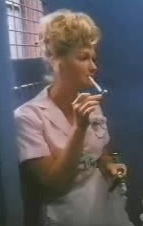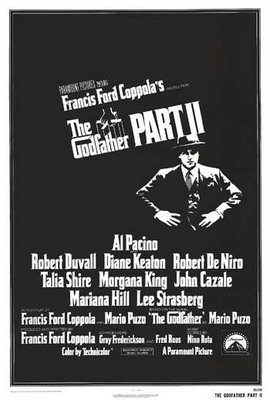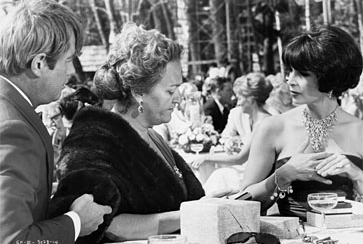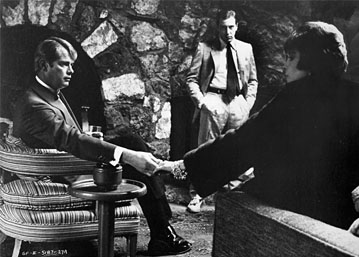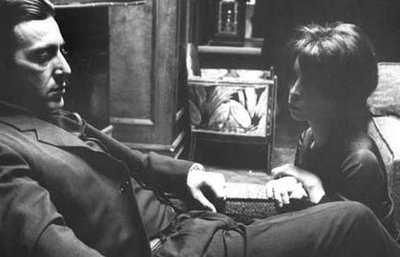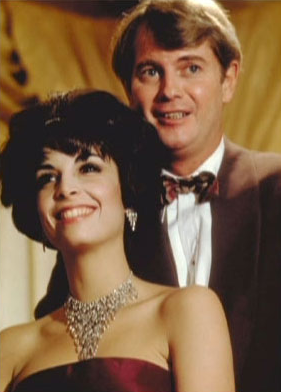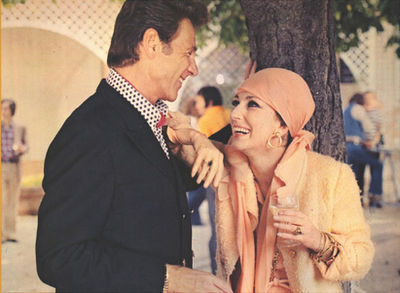The Year is 1974...
And the Supporting Actress Smackdowners for November are NICK of Nick's Pick Flicks; TIM of Mainly Movies; KEN of Canadian Ken On... and welcoming NEWLAND of As Bold As Brass. But alas, there is no NatReel or other montage but there is much to be said about...
And 1974's Supporting Actresses are...
(Each Smackdowner's comments are listed in ascending levels of love. A summary comment from each Smackdowner arrives at the end. Click on the nominee's name/film to see StinkyLulu's Supporting Actress Sunday review.)
Ingrid Bergman in Murder on the Orient ExpressKen Sez...
If this were an acting exercise from an unknown, it'd probably be roundly criticized by coach and classmates. Busy. Superficial. But because it's the famous Miss Bergman, everyone genuflects. And the Academy dutifully comes through with an Oscar. Go figure.
Nick Sez...
Okay: I like movie stars, too, but not when they’re gnawing away at barely dimensional characters in frivolous projects, and not when they win gratuitous third Oscars for their pains. (Paging you, too, Mr. Nicholson.) Unembarrassing, but utterly plain.
Newland Sez...
Bergman gave her all to dignify an absurd character, using all the tricks in the book to make an impact on the spectator. Fidgety and with a perennial expression of astonishment, she failed almost completely.
Stinkylulu Sez...
A solid and distinctive enough performance of a basically uninteresting character, nearly pitch-perfect to what the Agatha Christie formula requires. But sheesh. Bergman’s quirked out performance is alternately unremarkable and unwatchable. Ack.
Tim Sez...
Dear oh me – a much worse perf than I remembered, giving even the excruciating Finney a run for his money. Seemingly panicked by her all-star surroundings, Bergman does piety gormlessly and shiftiness fussily. Cretinous acting, and a shocking win.
Valentina Cortese in Day for NightStinkylulu Sez...
There's much to admire about this sensible, sensitive performance but something is missing from Cortese’s Severine– a vestigial "sensationalness" perhaps? a casual radiance? A merely good performance of a potentially magnificent role.
Nick Sez...
She conjures exactly the warmth, the laughs, and the sympathy she seeks in those early scenes, culminating in her sad, famous bouquet of blown takes. Still, the poignancy of the turn is shaped more by the director than by Cortese, and cliché is not entirely avoided.
Tim Sez...
Amuses as a self-pitying diva sighing at her reflection, and conjures a daffy-sad highlight from her multiple takes walking into the wrong door. But I was frustrated Truffaut didn’t make more of her in the second half.
Ken Sez...
A much-praised performance. Good - but is that all there is? There's a reason Cortese never achieved full-fledged stardom. She's capable and authoritative - but rather generic. Practically indistinguishable from other continental second-stringers like, say, Rosella Falk. Still, in this tepid field, a front-runner.
Newland Sez...
Flamboyant, decaying diva Sévérine is a delicious treat in the hands of Valentina Cortese. Seeing her repeat the same sequence once and again, and each time in a different way, gives a perfect example of what great actressing at the edges is like.
Madeline Kahn in Blazing SaddlesNick Sez...
Like Lesley Ann Warren’s in Victor/Victoria, this parody of blonde floozydom is seriously impaired by the film’s poor staging, structural problems, and limited objectives. Kahn’s walk-on is funny, sure, but it doesn’t resonate.
Tim Sez...
Little more than a skit but a skit to die for, Kahn’s drawling piss-take of a Dietrich floozy is all you could ask of it – sensationally silly revue material. She’s well worth her nomination but only helps this cruddy film so far.
Ken Sez...
The picture's barely worth a schoolboy snigger. But Kahn herself is deeply droll, nailing the Dietrich insolence, the off-key singing, the sang-froid. And socking home the patented Dietrich moment of romantic transfiguration with her rapturously delivered "Wot a nice guy!"
Stinkylulu Sez...
With uncommon precision, Kahn spins gold from this shallow gag of a character and effects an unexpected, accumulating magic, transforming a crass role into one that leaves a tender, comic afterglow.
Newland Sez...
Rising above her material, Kahn gives a memorable performance that transcends the Marlene Dietrich spoof and makes Lily Von Shtupp an instant classic. Her musical number “I’m tired” is hysterical, and from the moment she disappears from the screen, you’re left craving for more.
Diane Ladd in Alice Doesn't Live Here AnymoreKen Sez...
Diane Ladd hung around till Claire Trevor was too old to play Claire Trevor. Then pounced. She's more hard-bitten (and Trevor herself was no Little Nell). But a solid actor and re-actor. And if her Flo-Burger's only bite-sized, it's still tasty.
Nick Sez...
I used to begrudge this nomination, based on its stock-character aspect and Ladd’s limited screen-time. Upon review, though, Ladd does a fresher, scrappier, more inventive job than Cortese of imagining a full, interesting life beyond her glancing role.
Newland Sez...
Delivering her wisecracking lines or being sweet n’ sour in the sunbathing scene, Ladd makes you want to have breakfast with Flo every day of your life. A breeze of fresh air and a performance that really works.
Tim Sez...
Nicely underplays the sass, and provides a crucial bulwark to Burstyn in the late going. I don’t think Scorsese gives Flo quite enough independent life or pushes her anywhere that interesting, but it’s a pleasingly droll, dexterous bit of support.
Stinkylulu Sez...
She talks nearly nonstop but it’s Ladd’s wordless moments – her tentative glances and sideways looks – that anchor Flo's vivid emotional reality. A blowsy yet precise, understated, and palpably vulnerable performance.
Talia Shire in The Godfather, Part IINick Sez...
There is at least consistency to Shire’s hard, sour take on this part, but her approach feels flat and discordant compared to the rest of the vivid supporting cast, and the script begs for more dimension than she provides in her final plea to Michael.
Ken Sez...
You know the phenomenon. Big hit movie attracts nominations like iron filings to a magnet. Even in unlikely categories. What other explanation can there possibly be for nominating Shire's perfectly okay (and perfectly ordinary) contribution to Godfather 2? De Niro, though - wow!
Newland Sez...
Connie undergoes various changes throughout the film, from hapless tart to clan matriarch, which is enough to show Shire’s range. However, her scenes are so scattered that you barely notice the performance. Plus, she’s been better in both Parts I and III.
Stinkylulu Sez...
A thin but sturdy reed of a performance. When Shire's on-screen, she’s not at all bad; when she’s off-screen, the movie seems to forget about her. And so do we.
Tim Sez...
Registers only at the start and finish, but packs each close-up with expressive detail, reinforcing the whole arc of the movie with Connie’s switch in attitude – from defiantly abrasive to diplomatic and imploring. Her supplication for Fredo is a disciplined masterclass.
Oscar awarded Ingrid Bergman...
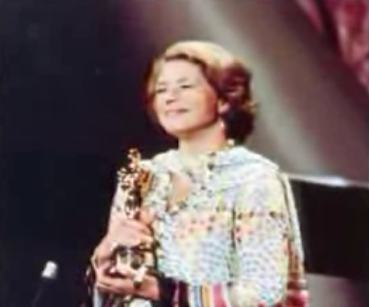
But, by a heart, the SMACKDOWN gives it to:
Valentina Cortese
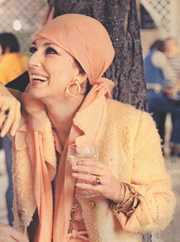 Valentina snagged 17 total hearts;
Valentina snagged 17 total hearts;
Madeline and Diane grabbed - respectively - 16 and 15.

But, by a heart, the SMACKDOWN gives it to:
Valentina Cortese
 Valentina snagged 17 total hearts;
Valentina snagged 17 total hearts;Madeline and Diane grabbed - respectively - 16 and 15.
But the big news is: For the first time in the history of the Smackdown, not only did a single performance receive unanimous single-heart votes BUT that very performance happened to be the one awarded by the Academy. So, by executive fiat, StinkyLulu hereby inaugurates a special Award...
THE STINKTRESS
Awarded to an Actress on The Edges
Honoring Special Achievement
in the Receipt of Acclaim, Awards, and Accolades
for an Exceptionally Mediocre, Overhyped, or Just Plain Bad Performance in a Film.
SO, until further notice (and future smackdowns),
Ingrid Bergman will wear the tiara as
the Supporting Actress Smackdown's first (& reigning)
STINKTRESS!!!
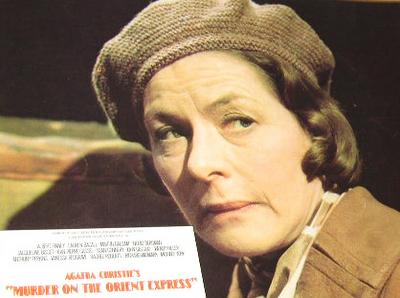
Ingrid Bergman in Murder on the Orient Express
Congrats, Ing!
Awarded to an Actress on The Edges
Honoring Special Achievement
in the Receipt of Acclaim, Awards, and Accolades
for an Exceptionally Mediocre, Overhyped, or Just Plain Bad Performance in a Film.
SO, until further notice (and future smackdowns),
Ingrid Bergman will wear the tiara as
the Supporting Actress Smackdown's first (& reigning)
STINKTRESS!!!

Ingrid Bergman in Murder on the Orient Express
Congrats, Ing!
And now some "Final Thoughts" from our intrepid SMACKDOWNERS:
Nick Sez: Jesus, what’s that smell??? One would be tempted to say that this race is one stinky lulu, if those terms hadn’t been so transcendentally reappropriated for the powers of good. As it stands, I’m just mystified: Bergman is as fully the idling, slumming star as Shire is the inexpressive, nepotistic inevitability. Kahn is as funny as she can be in a role and a movie that only want (and therefore get) inconsistent kitsch. Cortese and Ladd do very well, but not superbly well, with the sharply limited assignments they inherit. Admittedly, 1974’s bumper crop of masterpieces—with Chinatown, The Conversation, and A Woman Under the Influence leading the crop—have barely anything to offer to this category, and the actors apparently hated the double Oscar-winning Great Gatsby too much to toss a bone to the inimitable and Golden Globe-winning Karen Black. One film the actors clearly did see and deservedly enjoy was Claudine, so it’s a shame they didn’t acknowledge the fierce, wounded maturity of Tamu Blackwell as the eldest daughter of Diahann Carroll’s character. And it’s a shame that Valerie Perrine’s agent didn’t seize a pretty incredible opening on behalf of his client, who nonetheless must have relished her Best Actress nomination for her borderline lead/supporting role in Lenny. Ah well. I guess the rigid laws of Hollywood sexism demand that in the one year, rare as a unicorn, when all five Best Actress nominees are superlative and award-worthy, the supporting gals turn out to embody an all-time low. Can’t have too many good roles running around at one time, after all.
Ken Sez: Once the moral climate thawed out a bit, Hollywood never seemed to stop apologizing to Ingrid Bergman for the Rossellini era tar and feather treatment. But the Oscar for Orient Express was carrying it entirely too far. Even the actress herself seemed needled by the award. In a prickly acceptance speech, she virtually re-gifted it to Valentina Cortese - a clumsy gesture that can hardly have endeared her to the other three nominees, sweeping them implicitly, as it did, into her "I am not worthy" club. Still, four years later, she came back with a knock-out performance in Autumn Sonata (beautiful, nuanced work, confirming to the world that Bergman was still a brilliant - and growing - artist).
Newland Sez: The 1974 bunch of supporting actress nominees is indeed an unusual one for Oscar: rather than nominating archetypically dull mother or girlfriend roles, they chose five brief but pivotal performances, which is what the category should be about. Especially in the case of Kahn and Ladd, you’re left wishing for a bit more of their characters, who appear in the middle of the film and are sorely missed once they disappear. While Shire suffers from a thankless sister role with an unexplained character arch, Bergman was undeservingly rewarded for playing against type, uglifying herself and not appearing ridiculous while talking about brown children born backwards. She was right when she said on her acceptance speech that her Oscar belonged to Valentina Cortese, a performer of great skill who gives an acting masterclass playing a mediocre one.
Tim Sez: I’m on record for rating 1974 as one of Oscar’s banner years, but I’d forgotten quite how much of a dent the Bergman win – and Finney’s nomination – put in the acting categories. Still, knock her out (as I’m sure we have) and this is a good spread of nominees across wildly divergent genres: it’s nice to see voters having the balls to nominate brilliant comic work even in a rank misfire like Blazing Saddles. It strikes me that all these characters are fighting for more space in their movies, making do with curtailed screen time in jostling ensemble pieces, and while Kahn, Ladd and Cortese make more than enough of their opportunities to be nom-worthy, it’s Shire who really pulls out all the stops: only the heartbreaking, inexplicably unnominated John Cazale can match her for scene-playing in their film. There’s only one really rotten egg in this basket, right? And Bergman’s win, I have to concede, is Academy starfucking at its grimmest.
So, lovely reader, tell the Smackdowners what YOU think!
Join the dialogue in comments.
And be sure to...
VOTE
for December's Roster of
Supporting Actress Sundays
(current results here)
Join the dialogue in comments.
And be sure to...
VOTE
for December's Roster of
Supporting Actress Sundays
(current results here)
(And don't forget to
sign up for
the "Class of 2006"
Supporting Actress Blogathon!)
sign up for
the "Class of 2006"
Supporting Actress Blogathon!)










